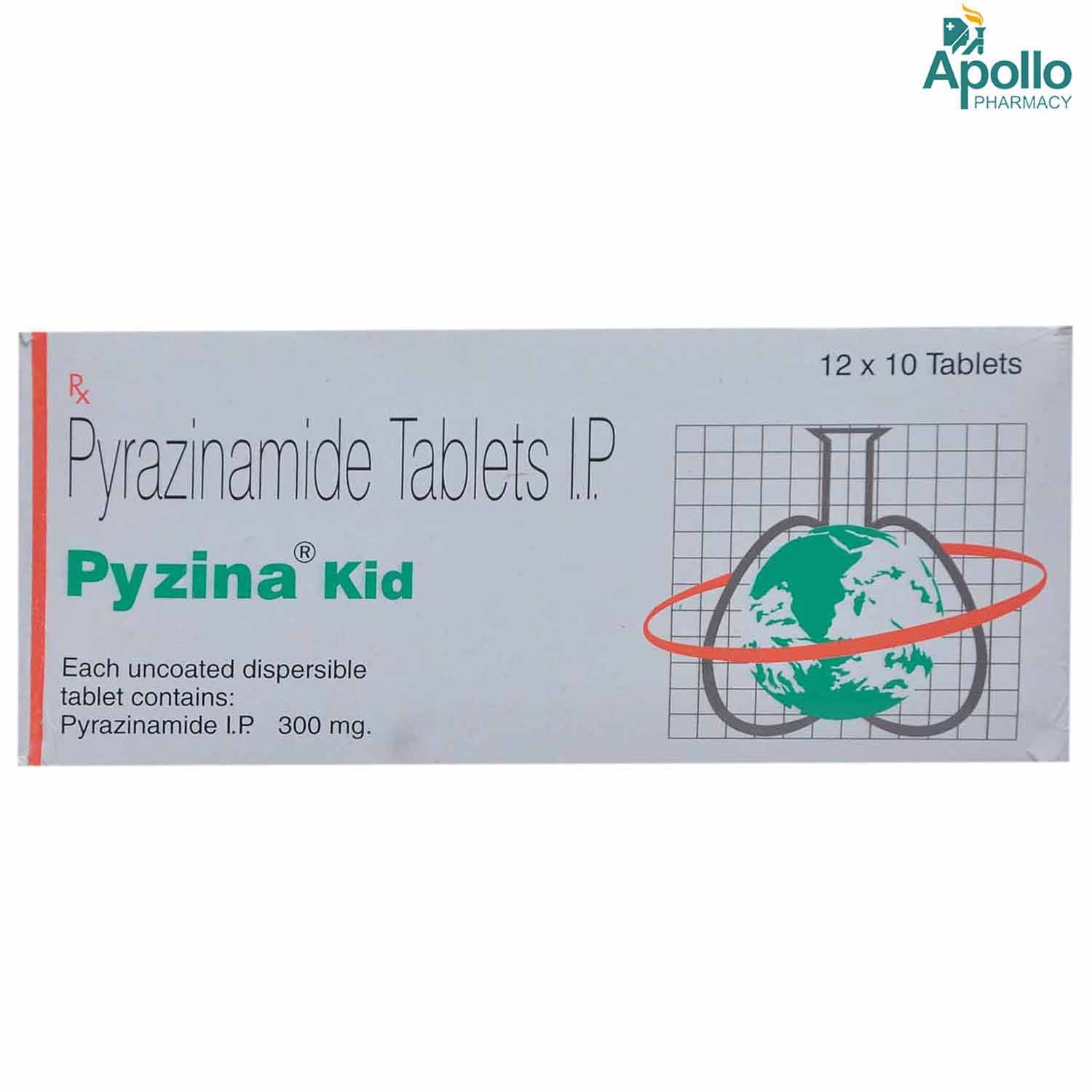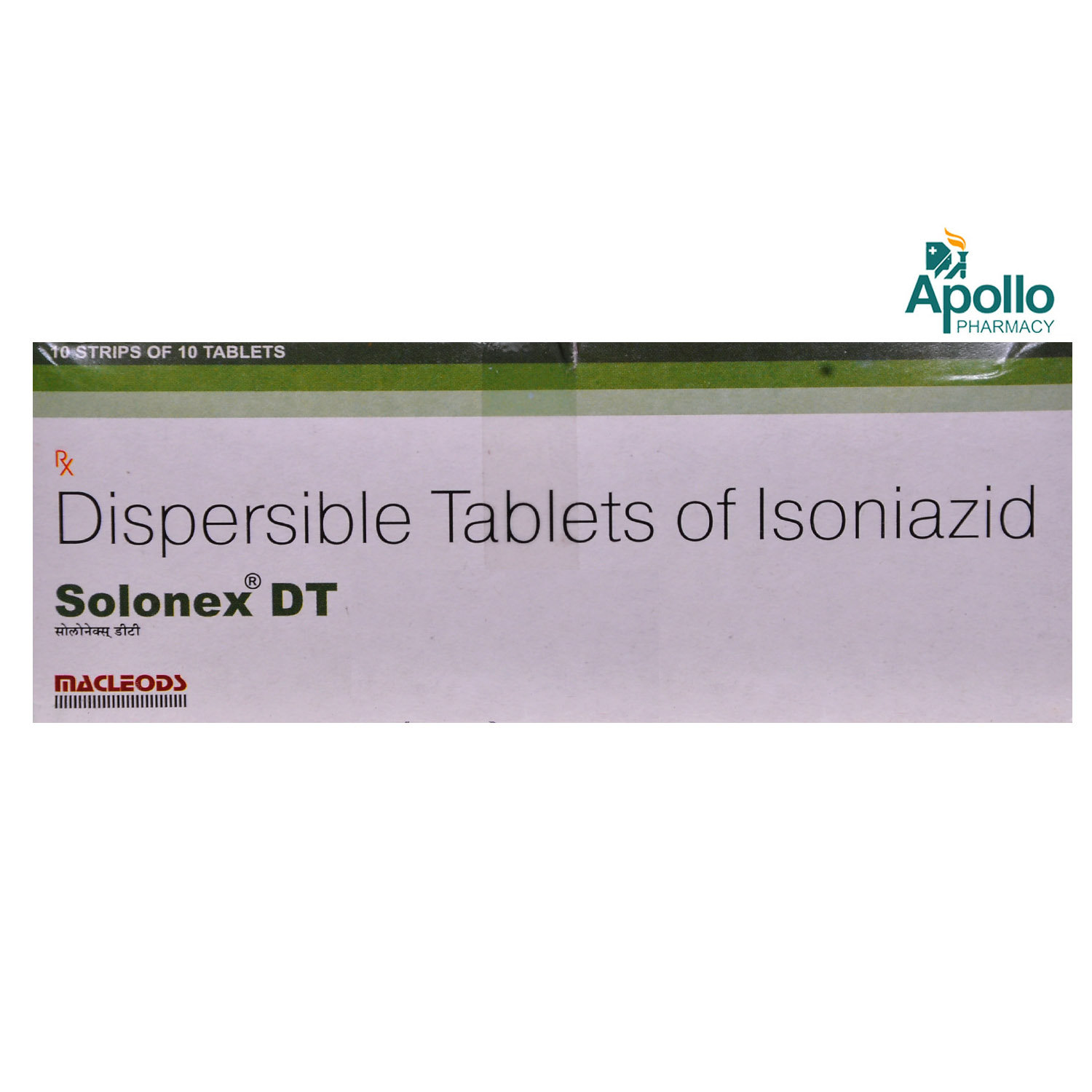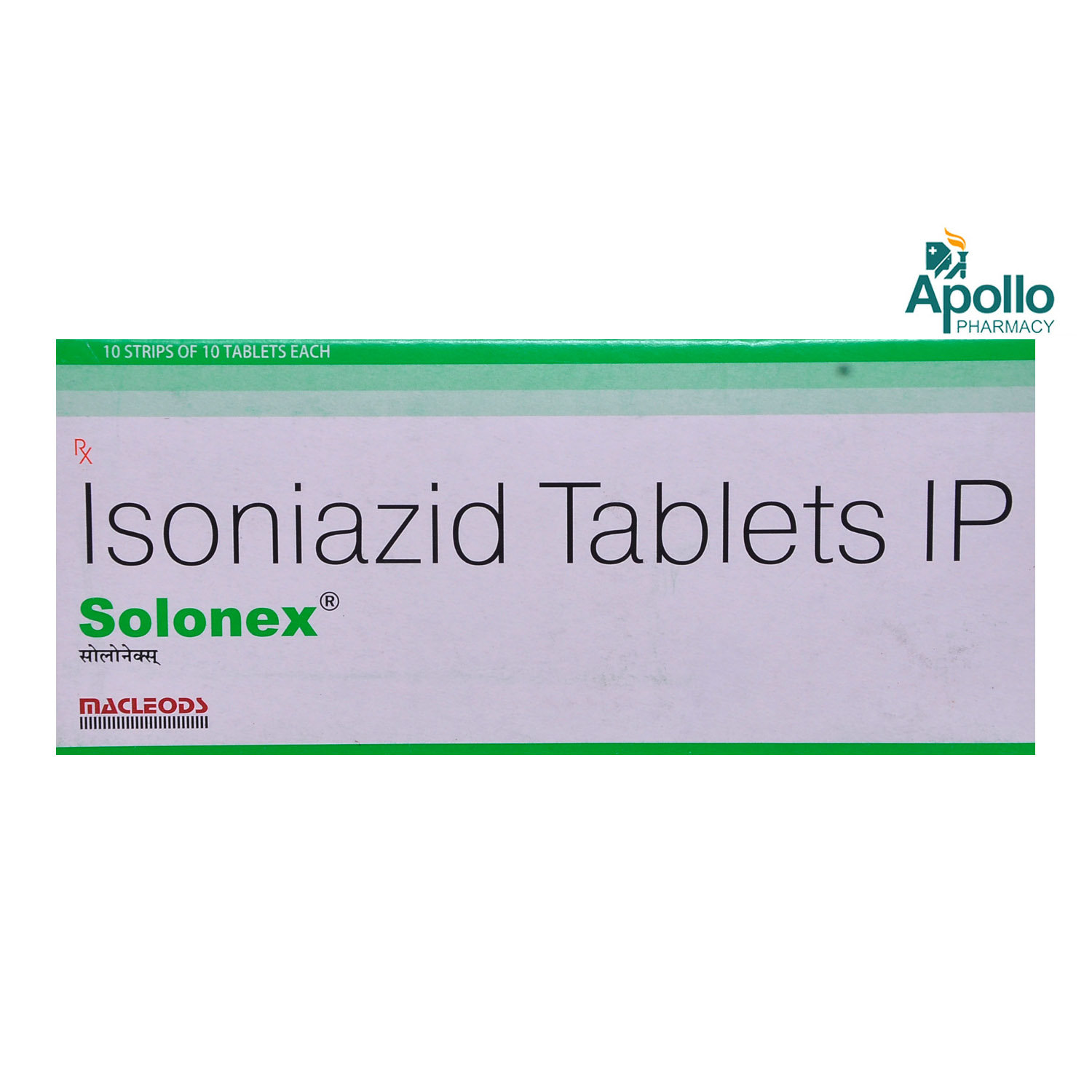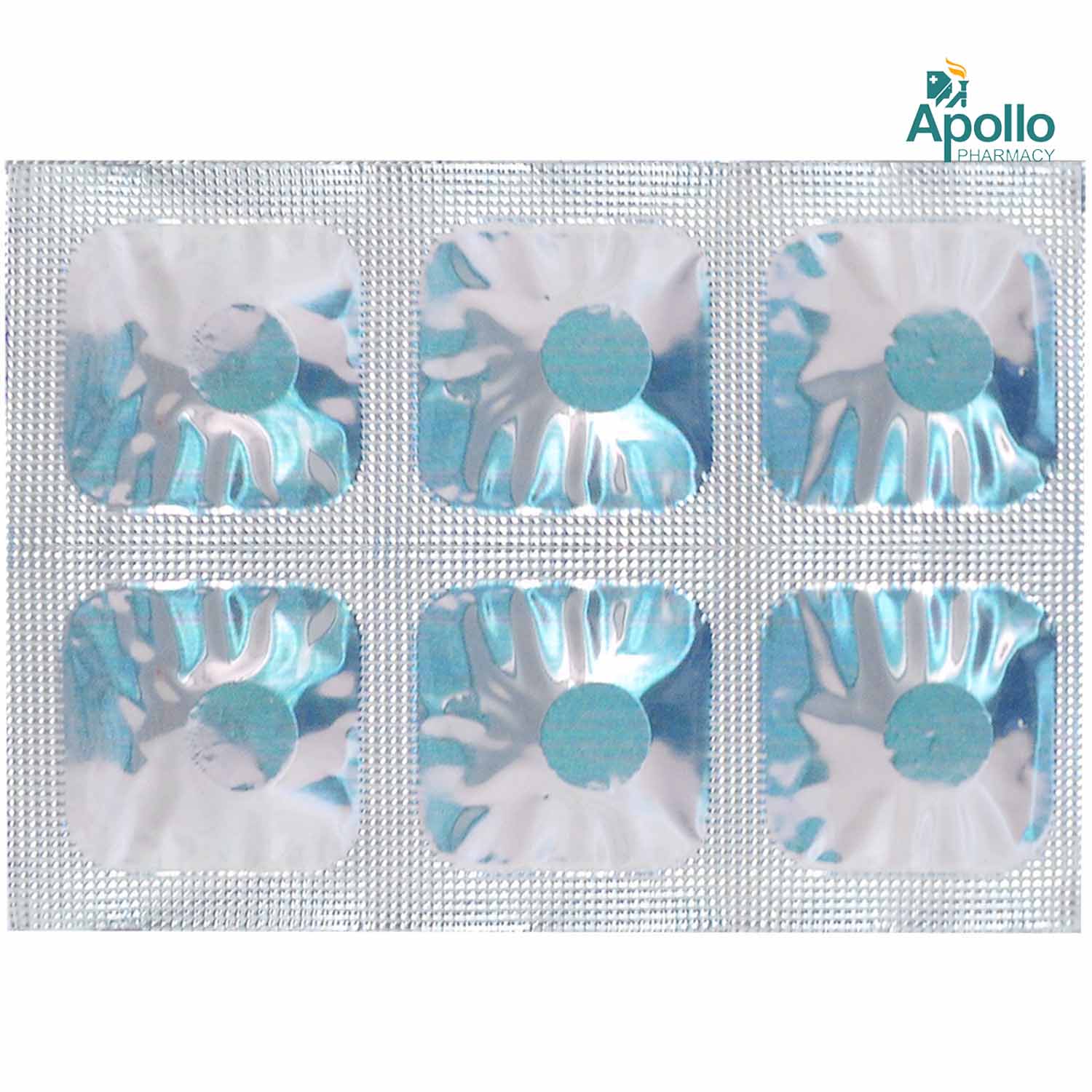Isoniazid
About Isoniazid
Isoniazid belongs to a group of medicines called anti-tubercular agents, which are primarily used to treat and prevent tuberculosis (TB). Tuberculosis is an infectious bacterial disease that mainly affects the lungs, but it can also spread to other parts of the body, including the kidneys, brain, spine, and bone marrow. Isoniazid does not work against infections caused by the virus.
Isoniazid contains isoniazid, an antibiotic that prevents bacteria from producing mycolic acids, an enzyme required for cell wall formation (protective coating). As a result of the disturbance in their metabolism, bacteria that lack a cell wall die and burst. Thus, Isoniazid inhibits the spread of infection by acting against the bacteria Mycobacterium tuberculosis, which causes tuberculosis.
Take Isoniazid for as long as your doctor has prescribed it based on your medical condition. Sometimes, you may experience fever, dizziness, nausea, stomach upset, loss of appetite, constipation, tiredness, numbness, or tingling in the feet or hands as side effects of Isoniazid. Most of these side effects do not require medical attention and typically resolve on their own over time. However, if any of these side effects persist or worsen, please consult your doctor.
Please tell your doctor if you are allergic to Isoniazid or any other medicines. If you are pregnant or breastfeeding, please inform your doctor before taking Isoniazid. Isoniazid may cause mental health problems, fits, or optic neuritis (swelling of the optic nerve that may cause vision loss) in some people. Therefore, avoid driving if you experience any of these symptoms after taking Isoniazid. Avoid foods and drinks containing histamine or tyramine, such as cured meats, matured cheeses, soy, tuna, salmon, mackerel, wine, and beer, while taking Isoniazid, as they may interact with this medication. If you have fits, diabetes, HIV infection, malnutrition, kidney or liver problems, or have suffered from psychosis (mental disturbances), inform your doctor before taking Isoniazid.
Uses of Isoniazid
Medicinal Benefits
Isoniazid contains isoniazid, an antibiotic used to treat and prevent tuberculosis. Isoniazid prevents bacteria from producing mycolic acids, which are essential for forming cell walls (a protective coating). Additionally, Isoniazid may combine with an enzyme that interferes with bacterial cell metabolism. Bacteria die as a result of the disruption in their metabolism and the lack of a cell wall. As a result, it kills Mycobacterium tuberculosis bacteria that cause tuberculosis (TB) and eliminates the infection.
Directions for Use
- Isoniazid should be taken on an empty stomach, at least 1 hour before or 2 hours after a meal.
- Your doctor will determine the dosage and timing of this medication based on your body weight and medical condition.
- Swallow Isoniazid as a whole with a glass of water.
- Do not crush, break, or chew it.
Storage
Side Effects of Isoniazid
- Fever
- Dizziness
- Nausea
- Stomach upset
- Loss of appetite
- Constipation
- Tiredness
- Numbness or tingling in the feet or hands
Drug Warnings
If you are known to be allergic to Isoniazid, please inform your doctor. If you are pregnant or breastfeeding, please inform your doctor before taking Isoniazid. Isoniazid may cause mental health problems, fits, or optic neuritis (swelling of the optic nerve that may cause vision loss) in some people. Therefore, avoid driving if you experience any of these symptoms after taking Isoniazid. Avoid foods and drinks containing a high level of tyramine, such as fermented foods, cheese, cured meat, soya, tuna, salmon, mackerel, wine, and beer, while taking Isoniazid as they might cause drug-food interaction. Avoid alcohol consumption with Isoniazid as it may cause liver damage. If you have fits, diabetes, HIV infection, malnutrition, kidney or liver problems, or have suffered from psychosis (mental disturbances), inform your doctor before taking Isoniazid.
Drug Interactions
Drug-Drug Interaction: Isoniazid may have interaction with anticonvulsants (carbamazepine, phenobarbital, valproic acid, phenytoin), medicines that help to sleep (flurazepam, midazolam, diazepam, triazolam), antipsychotics (haloperidol, chlorpromazine), medicines used to prevent blood clots (warfarin, phenindione), bronchodilator (theophylline), anti-arrhythmic drug (procainamide), antifungal (ketoconazole), corticosteroids (prednisolone), painkiller (paracetamol), opioids (alfentanil) and anaesthetic (enflurane).
Drug- Food Interaction: Avoid alcohol consumption with Isoniazid as it may increase the risk of liver damage. Avoid foods and drinks containing histamine or tyramine, such as cured meats, matured cheeses, soy, tuna, salmon, mackerel, wine, and beer, while taking Isoniazid, as they may cause an interaction.
Drug-Disease Interaction: If you have fits, diabetes, HIV infection, malnutrition, kidney or liver problems or have suffered from psychosis (mental disturbances), inform your doctor before taking Isoniazid.
Drug-Drug Interactions Checker List:
Safety Advice

Alcohol
unsafeAvoid alcohol consumption while on treatment with Isoniazid as it may increase the risk of liver damage. Please consult your doctor if you have any concerns.

Pregnancy
safe if prescribedIf you are pregnant, consult your doctor before taking Isoniazid. Your doctor may prescribe this medicine if the benefits outweigh the risks.

Breast Feeding
safe if prescribedIsoniazid is excreted in breast milk in low quantities. If you are breastfeeding, consult your doctor before taking Isoniazid. Your doctor may prescribe this medicine if the benefits outweigh the risks.

Driving
unsafeIsoniazid may cause mental health problems, fits or optic neuritis (swelling of the optic nerve that may cause vision loss) in some people. Therefore, avoid driving if you experience any of these symptoms after taking Isoniazid.

Liver
consult your doctorTake Isoniazid with caution, especially if you have a history of liver disease. Your doctor may adjust the dose of this medicine or prescribe a suitable alternative based on your condition.

Kidney
consult your doctorTake Isoniazid with caution, especially if you have a history of kidney disease. Your doctor may adjust the dose of this medicine or prescribe a suitable alternative based on your condition.

Children
cautionIsoniazid is not recommended for children below 3 months of age. However, in children above 3 months, Isoniazid should be used under medical supervision.
Habit Forming
Diet & Lifestyle Advise
- Vitamin C-rich foods such as kiwi, broccoli, and bell pepper help improve the immune system.
- Pineapple juice may help soothe the symptoms due to its anti-inflammatory properties.
- Avoid processed and fried foods.
- Warm ginger tea or warm soup can help relieve a cough.
- Avoid foods and drinks containing histamine or tyramine, such as cured meat, matured cheese, soya, tuna, salmon, mackerel, wine, and beer.
- Quit smoking and avoid alcohol consumption.
Special Advise
- Your doctor may recommend regular blood tests while you are taking Isoniazid to monitor your liver function.
- Consult a pulmonologist or lung specialist if you have had a persistent cough for three weeks or longer, chest pain, or coughing up blood or sputum from deep within the lungs.
- A monthly liver function test is advisable while using Isoniazid.
Patients Concern
Disease/Condition Glossary
Tuberculosis (TB) is an infectious bacterial disease that primarily affects the lungs. Still, it can also spread to other parts of the body, including the kidneys, brain, spine, and bone marrow. Tuberculosis is caused by a bacterium named Mycobacterium tuberculosis. It is a contagious disease that can spread to others through small droplets released into the air by a person with tuberculosis. Symptoms include a persistent cough lasting several weeks, chest pain while coughing or during normal breathing, unexplained fatigue, fever, night sweats, loss of appetite, and unintentional weight loss. People who smoke or consume alcohol, people diagnosed with HIV, and those with immune system problems are more likely to develop active TB.
FAQs
Isoniazid is used to treat and prevent tuberculosis (TB).
Isoniazid contains isoniazid, an antibiotic used to treat and prevent tuberculosis. Isoniazid prevents bacteria from producing mycolic acids, which are required to form cell walls (protective coating). Additionally, Isoniazid may combine with an enzyme that interferes with bacterial cell metabolism. Bacteria die due to the disruption in their metabolism and the lack of a cell wall. As a result, it kills Mycobacterium tuberculosis bacteria that cause tuberculosis (TB) and eliminates the infection.
It is not recommended to take Isoniazid with food. You are advised to take Isoniazid on an empty stomach at least 1 hour before a meal or 2 hours after a meal for better absorption.
You are recommended to avoid foods and drinks containing histamine or tyramine such as cured meat, matured cheese, soya, tuna, salmon, mackerel, wine, and beer as they may interact with Isoniazid and cause adverse effects such as sweating, headache, dizziness, light-headedness, flushing (reddening of the skin), fainting due to low blood pressure, uneven, fast or forceful heartbeat.
Yes, Isoniazid may cause liver problems in some patients. However, please consult your doctor if you notice symptoms such as yellowing of eyes or skin, dark urine, pale stools, weakness, loss of appetite, nausea or vomiting. Your doctor may monitor your liver function while on treatment with Isoniazid.
You are advised to consult a doctor before taking phenytoin with Isoniazid, as taking these medicines together may increase the levels of phenytoin in the blood and cause toxic effects. However, if you experience dizziness, vomiting, confusion or nausea, please consult your doctor.
Please do not stop taking Isoniazid suddenly without consulting your doctor, as it may cause withdrawal symptoms such as irritation, nervousness, difficulty sleeping, headache or having more dreams. Therefore, take Isoniazid for as long as your doctor has prescribed it. If you experience any difficulty while taking Isoniazid, please consult your doctor.
Isoniazid is not recommended for patients experiencing seizures, as it may increase the risk of recurring seizures. Therefore, it is advised to inform your doctor if you have a history of fits before taking Isoniazid.
Inform your doctor if your symptoms persist or worsen after completing the full course of Isoniazid. If you notice any undesirable effects that bother you while taking Isoniazid, consult your doctor.
If you miss taking a dose of Isoniazid, then take it as soon as you remember. However, if it is time for the next dose, skip the missed dose and continue with the regular dose. Avoid taking a double dose to make up for the missed one.
You are not recommended to stop taking Isoniazid even if you feel better, as you may experience unwanted side effects. Take Isoniazid as long as advised by a doctor for an effective response. However, contact a doctor if you have any concerns.
Isoniazid may cause side effects such as fever, dizziness, nausea, stomach upset, loss of appetite, constipation, tiredness, and numbness in the feet or hands. Most of these side effects are temporary and do not require any medical attention, as they will gradually reduce over time. However, contact your doctor if the side effects persist or worsen.








